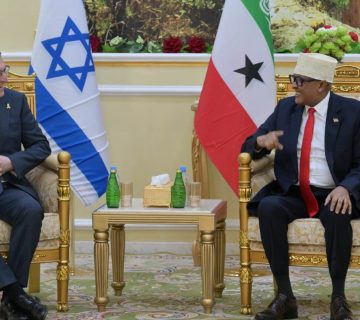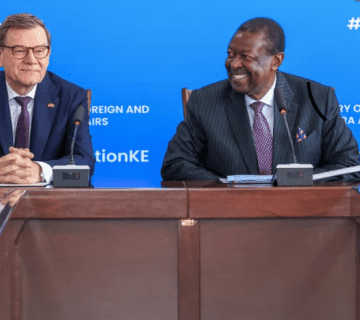November marks Youth Month in Africa, a period dedicated to celebrating and reflecting on the role of young people in shaping the continent’s future. The month is ushered in on November 1st with the commemoration of Africa Youth Day, recognised under the African Youth Charter, which came into effect in 2006.
This annual commemoration serves to remind governments and society of the commitments made under the Charter to empower the youth through education, employment opportunities, and participation in governance. Yet nearly two decades later, the Charter’s vision remains unevenly realised.
Africa’s Youth: Potential and Pressure
Africa has the youngest population in the world with more than 400 million people aged between the ages of 15 to 35 years. It is widely projected that by 2030 young Africans will constitute 42 per cent of the global youth population, a demographic dividend that could accelerate continental aspirations including Agenda 2063 and drive inclusive growth and sustainable development. Despite the demographic promise, young Africans continue to grapple with significant economic, social, and governance challenges that undermine their progress.
Despite representing the most educated and digitally connected generation in the continent’s history, youth unemployment remains one of the continent’s most pressing challenge. Data from the Africa Development Bank shows that every year between 10 and 12 million young Africans enter the labour market competing for only 3.1 million jobs created annually. Consequently, one-third of the youth are either unemployed or underemployed.
This unemployment crisis has far-reaching implications; it not only constrains individual economic prospects but also erodes public trust in political institutions which are widely perceived by youth as corrupt and far detached from their aspirations. These frustrations have given rise to several youth-led protests on the continent. In Kenya for example, the June 2024 Gen-Z protests initially triggered by tax hikes amid a cost-of-living crisis exposed deep-seated grievances including youth unemployment, corruption, accountability and police brutality. The protests mobilised thousands of young people nationwide and ultimately compelled the government to withdraw the controversial tax bill and reshuffle key cabinet positions. It also led to the resignation of the Inspector General of Police following public outrage over the excessive use of force by security agencies during the protests.
A similar pattern emerged in Madagascar, where youth-led protests erupted in September 2025, initially over frequent power and water cuts and soon evolved into a broader anti-government movement demanding economic justice and accountability. The government’s response was marked by heavy-handed repression, with security forces using live ammunition and mass arrests to quell dissent. The demonstrations culminated in the ouster of President Andry Rajoelina.
As Madagascar faces uncertainty over a return to civilian rule, the youth movements have also revealed a rising pattern of state repression and the shrinking space for democratic expression. In the face of growing dissent, governments are increasingly responding by limiting civil rights instead of addressing triggers and underlying drivers of youth unrest. Youth-led protests have been criminalised and met with excessive force, arbitrary arrests, and digital surveillance.
This year has also witnessed a number of contested elections on the continent, with Tanzania as the most recent example. The 29 October 2025 general elections was declared by the African Union observer mission in violation of AU principles for democratic elections, citing ballot-stuffing, exclusion of key opposition parties, and mass arrests during election-related protests. The mission also noted limited youth participation, falling short of the African Youth Charter’s objective of youth inclusion. This was attributed to structural barriers such as financial constraints, societal stereotypes, limited civic education, and an absence of deliberate policies to ensure youth representation.
Collectively, these governance failures weaken state capacity to design and implement policies aimed at empowering the youth. Such governance gaps also expose young people to economic marginalization, political exclusion, repression and in some cases, the risk of conflict.
Challenging the Status Quo
However, in the face of these challenges, young Africans are finding innovative ways to reclaim their agency and take ownership of their future. The youth are challenging and reshaping inherited systems, actively building the future on their own terms. Across the continent, their civic engagement is more assertive than ever. From Kenya’s Gen Z-led protests to Morocco’s Gen Z 212 uprisings, Madagascar’s September demonstrations, Cameroon’s post-election unrest and Tanzania’s youth led election protests, young people are mobilizing to demand better public services, lower living costs, more employment opportunities and an end to corrupt and stagnant leadership.
Additionally, the continent is seeing a new wave of activism as young people are harnessing social media and digital tools to organize, educate and amplify their causes. This has translated in the increase in the level of participation from within and across borders, turning protest from isolated national movements into a transcontinental wave of shared struggle and solidarity.
Platforms such as X, TikTok, and Instagram have blurred geographic boundaries, enabling young people to witness, learn from, and support one another’s fights for justice and accountability. For instance, after Kenya’s June 25, 2024, Finance Bill protests, where the slogan #OccupyParliament became a rallying cry against corruption and economic hardship, Ugandan youths picked a leaf and announced a similar protest for July 23, 2024, dubbed “The March to Parliament Protests” demanding transparency and an end to graft among government officials. Shortly after, in Nigeria, youth-led protests under the banner #EndBadGovernance erupted in early August, with organizers explicitly citing Kenya’s Gen Z uprising as a catalyst.
Through social media, African youth are cultivating a continental consciousness, recognizing that their struggles against unemployment, corruption, repression, and poor governance are intertwined. These platforms have become both the megaphone and meeting ground for this generation, amplifying local voices into a shared African call for accountability, justice, and systemic reform.
Innovating for Peace and Security
Reflecting on peace and security in Africa, youth often become the first recruits in conflicts, yet they also bear the harshest burdens of war. In 2025, as conflicts across Africa have intensified. Young people are decisively stepping into roles as peacebuilders, crisis responders, and system-shapers. In Sudan, for instance, youth-led organisations such as the Youth Citizens Observers Network (YCON) have mobilised a nationwide network of trained observers who monitor the political, humanitarian and security landscape. The youth in Sudan publish detailed reports, propose policy recommendations and amplify youth voices to national and international decision-makers. At the same time, volunteer-run community hubs known as Emergency Response Rooms (ERRs) are coordinated by young people to repair infrastructure, map safe escape routes and deliver essential services in conflict-torn neighbourhoods.
Similarly, in Ethiopia and Somalia, young people are employing digital tools to challenge violent narratives, bridge inter-communal divides and create localised peace initiatives. Through organisations such as the Federation of Somali Journalists (FESOJ), content creators in Mogadishu are producing social-media content focused on conflict prevention and peacebuilding, equipping youth to craft narratives that counter violent extremism. Parallel initiatives in Ethiopia, such as the #DefyHateNow project, train youth, educators and content creators in fact-checking, media literacy and responding to online hate speech. By elevating youth voices to debunk disinformation and rhetoric of hate, these programmes build digital movements of peer educators and storytellers building trust and promoting inclusive narratives.
Charting the Future
Looking ahead and reflecting on both the challenges and agency of youth to date, Africa still has a long way to go in realising “the Africa We Want.” This year’s surge in youth‐driven activism signals a potential shift in the continent’s political landscape. Yet for real change, young people must go beyond trending hashtags. Mobilization must evolve into broader strategies with defined and tangible objectives, and youth movements should build institutional structures and sustain momentum long after the first protest, so that their efforts are not hijacked by opportunistic elites who arrive with empty promises.
Concurrently, governments have a vital responsibility. Under African Youth Charter (Article 11 on youth participation, Article 13 on skills and empowerment) governments must not only ratify the Charter which 72 percent of states already have but move towards realisation and turning commitments into measurable policy, youth quotas, platforms and programmes. Only then, with resilient youth movements, responsive governments and strong international partnerships, will Africa reach its ambition of a just, inclusive and youth-shaped future.
Judy Mbugua and Elizabeth are Strategic Communications Officers at the HORN Institute.
Photo Credits: Ben Curtis/AP Photo



